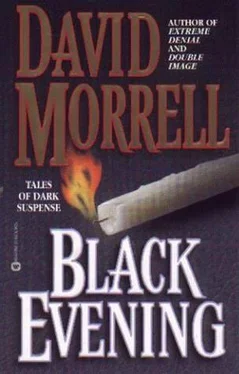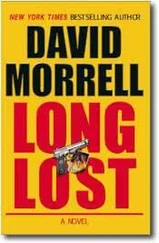David Morrell - Black Evening
Здесь есть возможность читать онлайн «David Morrell - Black Evening» весь текст электронной книги совершенно бесплатно (целиком полную версию без сокращений). В некоторых случаях можно слушать аудио, скачать через торрент в формате fb2 и присутствует краткое содержание. Жанр: Ужасы и Мистика, на английском языке. Описание произведения, (предисловие) а так же отзывы посетителей доступны на портале библиотеки ЛибКат.
- Название:Black Evening
- Автор:
- Жанр:
- Год:неизвестен
- ISBN:нет данных
- Рейтинг книги:4 / 5. Голосов: 1
-
Избранное:Добавить в избранное
- Отзывы:
-
Ваша оценка:
- 80
- 1
- 2
- 3
- 4
- 5
Black Evening: краткое содержание, описание и аннотация
Предлагаем к чтению аннотацию, описание, краткое содержание или предисловие (зависит от того, что написал сам автор книги «Black Evening»). Если вы не нашли необходимую информацию о книге — напишите в комментариях, мы постараемся отыскать её.
Black Evening — читать онлайн бесплатно полную книгу (весь текст) целиком
Ниже представлен текст книги, разбитый по страницам. Система сохранения места последней прочитанной страницы, позволяет с удобством читать онлайн бесплатно книгу «Black Evening», без необходимости каждый раз заново искать на чём Вы остановились. Поставьте закладку, и сможете в любой момент перейти на страницу, на которой закончили чтение.
Интервал:
Закладка:
Feeling vitalized, I immediately set to work to write the story so that I could find out what happened next. I called it "The Plinker," referring to a man who goes off one morning to do some target shooting (the slang term is "plinking") and discovers to his horror that someone else is in the woods and is interested in a different kind of target shooting. The story was written long before serial killers and stalkers became the subject of fiction, and when I gave it to Philip Klass, he must have sensed my excitement because he read it much sooner than he had the others I had given him. He phoned and invited me to join him at a coffee house at 4 p.m., and thus began one of the most unique afternoons, evenings, and nights of my life.
First, Klass told me he was amazed that I had written a story so different from the others, one that had strongly engaged his attention. Then he asked if I'd been reading Geoffrey Household. I shook my head no. Geoffrey who? The British suspense writer, Klass answered. Household's two most famous novels were Rogue Male (1939) and Watcher in the Shadows (1960), the former about a British big-game hunter who stalks Hitler on the eve of the Second World War. Later, when I read Household's work, I did recognize a kinship. Household's fiction was best when it dealt with threats from unknown forces. The more frightened and vulnerable the heroes were, the more I identified with them. That ferret in my psyche again.
My ignorance about Geoffrey Household revealed another of my limitations. I hadn't read any suspense fiction or popular literature of any kind. As a teenager, I had been motivated to become a writer because of my fascination with Stirling Silliphant's scripts for the 1960-64 television show Route 66 in which two young men drove across the United States in a Corvette, searching for America and themselves. Silliphant combined action with ideas. But my desire to emulate him had led me more toward ideas than action. After years of studying literature in college, I had become so saturated with Hawthorne, Melville, Faulkner, and other classic authors that my fiction felt stale and imitative, literary in the worst sense of the word. But not anymore. I remembered the thrilling contemporary feel of Route 66 and why I had wanted to be a writer in the first place. I resolved to read as many current novels, popular novels as I could, beginning with Household – because if I was going to write action stories with a difference, then I had better find out what the best action writers had already done so that I wouldn't repeat what they had already accomplished.
At the coffee house, Klass and I discussed these issues and were surprised to discover that three hours had passed. It was now 7 p.m. I was due home for dinner, but Klass asked if I'd be willing to go to his apartment, meet his wife, and continue the discussion. After months spent trying to get Klass's attention, I felt my heart leap at the invitation. Quickly I phoned my wife and explained the situation. Klass and I then went to his apartment, where our discussion became deeper and more intense.
The best fiction, Klass maintained, came from a writer's compulsion to communicate traumatic personal events. Often the writer had so repressed those events that the writer wasn't aware of the source of the compulsion. But whether consciously done or not, this self-psychoanalysis made a writer's work unique – because the psychological effects of trauma are unique to each person. You could tell the bad writers from the good writers because the bad writers were motivated by money and ego, whereas the good writers practiced their craft for the insistent reason that they had to be writers, that they had no choice, that something inside them (the ferret) was gnawing at their imaginations and the festering pressure had to be released. Often daydreams were a signal of those pressures, Klass felt, spontaneous messages from the subconscious, subliminal hints about stories that wanted to be told.
What were my own festering pressures? My fiction would reveal them, Klass said, and it has. In retrospect, I'm amazed by the disguised revelations in what I've written: that my father died shortly after I was born, that he was killed in the Second World War, that I grew up with a morbid fear of war, that economic necessity forced my mother to put me in an orphanage for a time, that I could never be sure whether the woman who reclaimed me was the same person who had given me up, that I persistently felt the lack of a father figure, that my fear of violence eventually prompted me to confront my fear by joining a street gang… I could go on, but it isn't wise to face traumas directly. Otherwise, I might lose the compulsion to write about them.
These were the sorts of things that Klass and I kept talking about in his apartment. Again time sped by, and we were surprised to discover that it was now ten at night. Klass's engaging wife, Fruma, had participated in the discussion. Now she invited me to stay for a late dinner. Until midnight, the three of us ate pot roast and talked. Then we cleared the dishes, and Klass spread the pages of my story on the dining room table. He analyzed every sentence for me, explaining why this technique worked but that one didn't, showing me new ways to accomplish a scene, giving me pointers about dialogue, about structure, discussing pace, teaching me how to make description feel like action.
At last, he reached the final sentence on the final page, summed up his remarks, handed me the story, and said, "That's all. That's the limit of what I'm going to teach you." Through the window behind him, the night was turning gray. Birds began to sing. Dawn was approaching. Spellbound by Klass's wisdom, I had lost track of time. Now that the session was over, I felt exhausted. But after thanking him, after starting home, no matter how tired I was, I felt buoyed by an excitement that seemed to lift me off the sidewalk. The memory is vivid to me: the night I became convinced that I would be a writer.
What happened to that story, "The Plinker"? It was never published. The magazines to which I submitted it found it too strong (although it wouldn't be today). I tried for a year. One magazine kept it so long that I had hopes, but one day the story was returned to me – wrinkled, dog-eared, coffee-stained – with a note informing me that the magazine was going out of business and someone had found my manuscript stuffed in a drawer. Undaunted, I eventually put the story away, because my attention had become fixated on another story. A novel, actually. About a Special Forces Vietnam veteran who engages in a deadly duel with a small-town police chief, a Marine Corps veteran from Korea. The plot was about the generation gap, the difference between the fifties and the sixties, about the differences between Korea and Vietnam, about hawks and doves, about mental programming. I called it First Blood . It was dedicated to Philip Klass and his pen name, William Tenn, "each in his own way," because the generous teacher and the gifted fiction writer, both the same person, had helped me. I sent the novel to Geoffrey Household. He wrote a kind letter back to me, telling me that the action was too strong.
"The Plinker" doesn't appear in this collection. As important as the story is to me, I find it unsatisfying now – the work of an apprentice. Some readers might even mistakenly conclude that it is derivative of Deliverance rather than a predecessor of it. Protective of it, I keep it to myself. But the stories that are included here, presented in order of composition, seem to me to wear their age well. Tales of dark suspense, their approach is different from that of my international thrillers. You won't find spies and round-the-globe intrigue here. What you will find are the stark emotions behind that intrigue: fear and trembling. The ferret keeps scurrying in my psyche. These are some of its traces.
Читать дальшеИнтервал:
Закладка:
Похожие книги на «Black Evening»
Представляем Вашему вниманию похожие книги на «Black Evening» списком для выбора. Мы отобрали схожую по названию и смыслу литературу в надежде предоставить читателям больше вариантов отыскать новые, интересные, ещё непрочитанные произведения.
Обсуждение, отзывы о книге «Black Evening» и просто собственные мнения читателей. Оставьте ваши комментарии, напишите, что Вы думаете о произведении, его смысле или главных героях. Укажите что конкретно понравилось, а что нет, и почему Вы так считаете.












